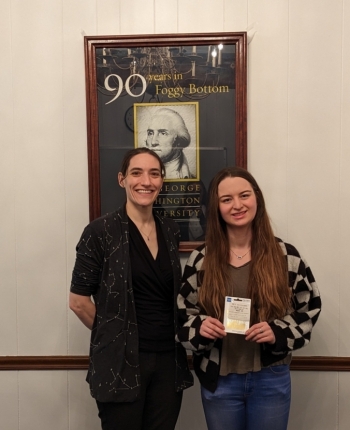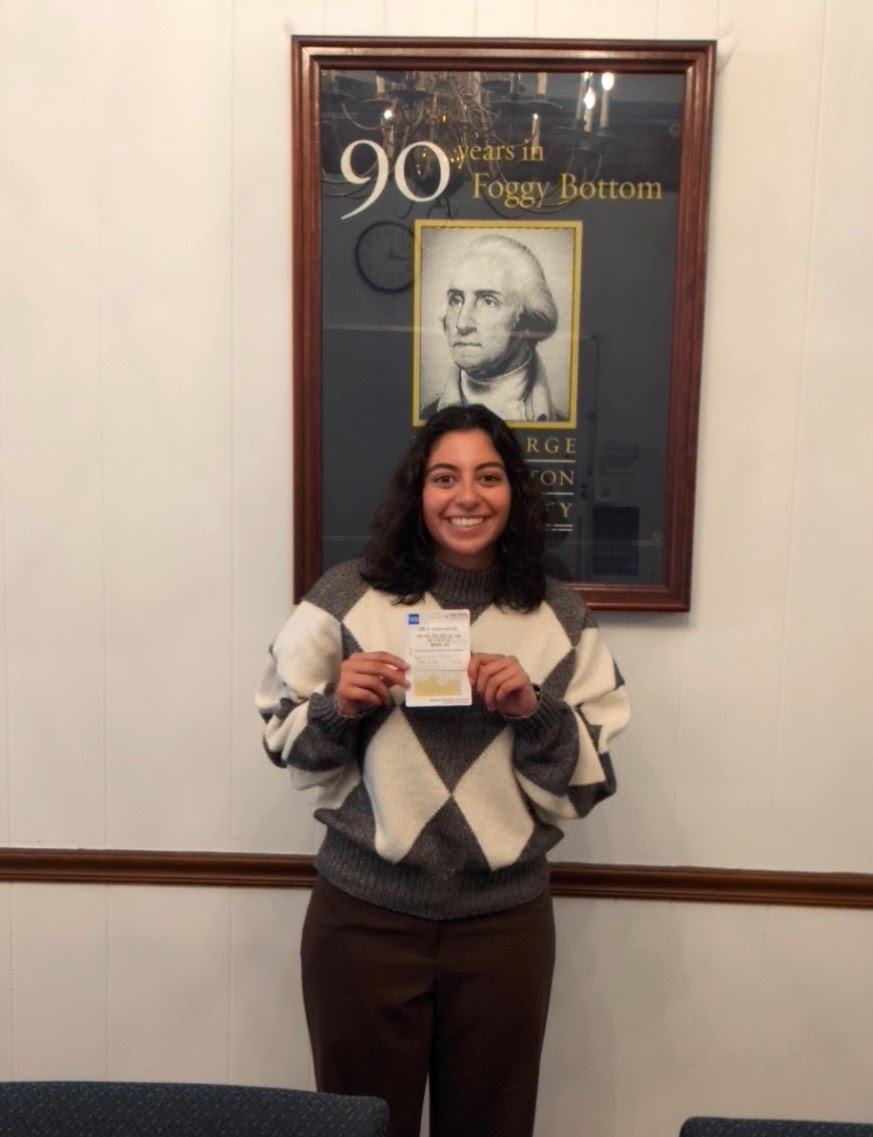Congratulations to our Phi Beta Kappa Essay Contest Winners!
First Prize: Avery Dell (CCAS '24)
Essay prompt: "Why is a liberal arts education of value to you, personally?"
I have a rather odd nickname for my roommate. Ever since we met in Somers Hall first year I have affectionately called her Beep Boop. To the undiscerning listener, this may sound like a silly teletubbie-esque moniker, but in fact it is in reference to her intelligence and academic prowess. Beep Boop is a computer science major, and while she was once attempting to explain a struggle she was facing with her homework during our first year, I became utterly confused by the digits and bugs presented. I simply stated “so the beep boop doesn't work.” The nickname stuck.
My other roomate’s nickname is equally as impressive, but no less abstract. She is occasionally referred to as Superhero, a reference to her passion for equity in political journalism and her work serving on the board of Amnesty international here at GWU.
In our small apartment live three intelligent women who collectively cover 7 different academic departments and 5 different majors. I study Theatre and Organizational Sciences with a minor in Sustainability, Beep Boop excels in Computer Sciences and Interaction Design, and Superhero shines in Political Communications with a minor in Spanish. We each take deep breaths before answering the question “what do you study in college?”
Although our degree classifications are complicated and our time spent on banweb lengthy, this is what best describes the value of a liberal arts education to me. All three of us have the freedom and opportunity to explore and excel in a wide variety of academic fields. We are constantly encouraged to learn more, pushing ourselves to new feats of knowledge we previously thought impossible. The sheer diversity of our understanding makes us each individually curious, but combined serves to create thought provoking dinner discussions, late night study sessions, and an endless stream of fun facts tossed back and forth while we lounge on our couch.
It is no secret that in this day and age, upskilling and diverse perspectives are two of the most crucial facets employers seek in candidates, something which has long been touted by liberal arts institutions. While I have learned plenty of that in my time here at GWU, I believe that the greatest benefit I have received comes from the interactions with my classmates and roommates. Although of great importance, no standardized exam will ever live up to the significance of modeling web-designed dresses for Beep Boop, answering political polling questions for Superhero, or watching both of them concentrate intensely on holding an Iphone camera stable while I filmed an audition.
The value of my liberal arts education has transformed into the value of our liberal arts education. While I may not always understand the mechanics of the python coding language or be able to conjugate past participle verbs, I feel proud of the fact that my education has been bettered by my roommates, and hopeful that theirs has been supported by mine.

*******
Second Prize: Anuka Upadhye (ESIA '23)
Essay prompt: "What's an insight you gained outside of GW (maybe through service learning, an internship, or a research project) that you brought into your academic work at GW?"
When I read about misogynistic power structures within the confines of my WGSS textbooks, in a class full of like-minded people, it is easy to say that I would do the right thing to fight against the patriarchy. Speak up, call people out, tell them that what they are doing is wrong. But no one prepares you for the shock. The silence, The inability to think in the moment and the after-the-fact guilt of failing to speak up. My mom taught me to fight.
Since I moved away to college, my empty-nester mom has reinvested time into her career and self-discovery. These two interests converged when she was sent to the Philippines and India for over five months to train new employees. Far away from home, liberated from the cyclicality of chores and everyday routines, my mom embarked on what I like to think of as an adult bildungsroman. Discovering the nooks and crannies of the city on foot, and through every step, rediscovering herself.
Then she came back. Nothing had really changed at home. We attended a Diwali party and everyone clamored, “Gone for that long? How do you manage it all?” “You were gone for so long we thought you had met someone over there and ditched your husband!” I laughed. My mom glared. Seconds later, I realized what I had enabled. My laughter was replaced by paralyzing silence. My mom asserted to the crowd: “Why do you have to demean me like that? Why would you assume I was gone for so long just because I found someone? As if that’s a woman's only purpose? Does it bother you that for once I chose my career over my family?”
“Relax, Shilpa. It was just a joke. I’m sorry.”
I saw my mother, trembling from confrontation, in a new light. I saw her on par with the greats like Audre Lorde and bell hooks, an embodiment of words on a page into life. She represented something I read over and over in my classes but never quite understood until that moment. The personal is political. Even a seemingly small moment, her personal experience, is no less part of the feminist political movement. And my laughter, my silence, on the other hand, revealed to me that I have so much learning left to do. I tout myself as a WGSS student on paper, and can quote fancy theories and list feminist scholars, but what does that mean when I can’t stand up to the oppression that I have learned to identify? My mom is an apt reminder to me that WGSS is a handbook for life, not only reserved for long-winded academic articles and seminar rooms. It is grounded in the everyday, created by those who experience the brunt of the patriarchy. This experience has taught me that to supplement my traditional education, I should look at everyone in my life as active producers of change, as change starts from the most personal, vulnerable moments.


